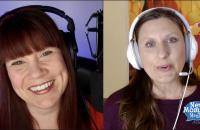Transcript: Is Homebirth Right For Me?
Sunny Gault
You're thinking about giving birth at home. But how do you know if that's the best decision for you and your family? I'm Sunny with New Mommy Media. And today I am joined by Cheryl Furer. She is a midwife educator. And she's also the founder of Your Thriving Pregnancy. Cheryl, thanks so much for being with us today.
Cheryl Furer
Thanks for having me, Sunny.
Sunny Gault
Cheryl, how popular are homebirths? Are they growing in popularity? What would you say?
Cheryl Furer
Over the last 10 years, home births have been growing in popularity, we still are only about 1% of all births, though. So everywhere in the United States is a little different. But it could be up to three and down to about 0% in different parts of the US. And that's only the recorded numbers. So there may be some outside of that, but for the most part, an average is 1% of people are giving birth at home.
Sunny Gault
Okay. And how has that changed over the years? Like, are we seeing any kind of increase at all or have we flatlined, I'm sure with all the restrictions we've had over the last year or so with COVID. And everything that the numbers may have adjusted a little bit, right.
Cheryl Furer
Yeah, people who are on the fence about potentially maybe birthing of a birth center or at home, they definitely switched over to having a home birth, or into a birth center. Due to the restrictions of the last year. And even into this year, we've had more inquiries about home birth. And I think it's because of just ongoing concerns about who is allowed to be with them for their birth, and how their birth is going to look in a hospital setting.
Sunny Gault
And when moms come to you, what are some of the common questions that they have about home birth?
Cheryl Furer
Yeah, it sort of depends on where they are on their journey to. But I think one of the most common questions that moms and partners want to know about is, Is it safe? Is this of reasonable consideration for us in our family. And there are statistics, I participate in a national statistics project that collects statistics from out-of-hospital births from all over the United States. And our statistics are really good. We only take people who don't have any pre-existing conditions. So if somebody has type one diabetes, or if they have, you know, pre-existing heart conditions they are, they're probably not eligible for an out-of-hospital birth. But they're, I think people would be surprised about how, you know, a lot of people sort of risk themselves out without talking to a midwife. And so I would, you know, suggest talking to a midwife first and seeing if it's even an elder if they're eligible or not. Sometimes people risk themselves out for age or for, you know, previous birth experience, whether they've had a cesarian in a previous birth or not. And so my suggestion would always be to talk to a local midwife to find some, you know, local birth center, local home birth practice, or even a hospital-based midwifery practice. Because you can get a lot of more individualized care in those settings than you will elsewhere. I
Sunny Gault
still feel like there is a lot of fear around birth, even though moms are choosing some different things that are kind of outside the box, we still kind of have this built in fear, even though many, many women give birth, you know, even every year, right? And so what would you say are some of the misconceptions specifically around home birth that people have?
Cheryl Furer
One of them is people ask me if it's messy. You know, we have a pre-disposition thinking that birth might be really uncomfortable or messy at home, but we I usually just take out one little bag of trash at the end, we use disposable absorbent pads and things like that. And we actually usually leave your house cleaner than we got there. That's a bonus. Yeah. People also are concerned about, you know, what do we do if we transport if we need to go to the hospital and that's one thing I tell a lot of my clients or people I'm interviewing is that when you start out at home, you can always go up to a higher level of care. So if you're starting out at home, or I'll also include a birth center because those are free CME. A freestanding birth center. If, if the need arises, we can always go up to the hospital. But if you are low risk and healthy and you walk into a hospital, you can't go down the chain If you can't say, Well, I think I'm doing well. And I actually just want to stay at home, they're not gonna say, Well, okay, well, we'll just follow you back home. Right. And so we can always go up the level chain. And also midwives are skilled care providers. Whether we went, we've we've all had formal training. So whether we went through a higher education, which have only been around for the felt the past 40 years, which I know seems like a long time, but there's lots of care providers who are more than practicing for that 40 years. Or they may have gone through an apprenticeship-based model where they were taken under the wing of an elder midwife and learned for 10 years, the ropes of midwifery that, that we are skilled professionals, and we have plans in place for emergencies for non emergencies. Our skills are to help stabilize or resolve a problem until we can get to a higher level of care if that's what's needed. And so that that peace around safety is a huge one, of course, I would be concerned about that, too. And because I've done a lot of the research, and I read a lot of the studies that are out there, it's actually a very safe option for most families.
Sunny Gault
But what about the overall cost? Because I would think some families would have questions about that. We are more familiar with going through insurance companies and whatever and you know, paying for things that way, getting a bill afterward. But I would imagine there's a lot of things that probably have to come out of pocket for having a home birth.
Cheryl Furer
It depends on what state you're in. So in some states, they actually are covered by Medicaid midwives are covered by Medicaid and you can have out-of-hospital births in that state. Those states are very few there's actually action on a national level to get midwifery care under Medicaid for all states. But until that happens, we do have a lot of places where people are paying out of pocket. The fortunate thing about that is it's usually less than their deductible. So they actually find that they have savings in going through a midwifery practice and having a successful home birth.
Sunny Gault
Interesting. All right. Well, thank you so much, Cheryl. If you want to check out Cheryl's business, you can head on over to her website, which is yourthrivingpregnancy.com Also, be sure to check out our website. It's newmommymedia.com. We have our podcast episodes up on our website. We have videos like the one you're watching right now, we also have plenty of blog posts. It's where real moms talk about real life.
Recommended Videos for You
Episode Transcript
Sunny Gault
You're thinking about giving birth at home. But how do you know if that's the best decision for you and your family? I'm Sunny with New Mommy Media. And today I am joined by Cheryl Furer. She is a midwife educator. And she's also the founder of Your Thriving Pregnancy. Cheryl, thanks so much for being with us today.
Cheryl Furer
Thanks for having me, Sunny.
Sunny Gault
Cheryl, how popular are homebirths? Are they growing in popularity? What would you say?
Cheryl Furer
Over the last 10 years, home births have been growing in popularity, we still are only about 1% of all births, though. So everywhere in the United States is a little different. But it could be up to three and down to about 0% in different parts of the US. And that's only the recorded numbers. So there may be some outside of that, but for the most part, an average is 1% of people are giving birth at home.
Sunny Gault
Okay. And how has that changed over the years? Like, are we seeing any kind of increase at all or have we flatlined, I'm sure with all the restrictions we've had over the last year or so with COVID. And everything that the numbers may have adjusted a little bit, right.
Cheryl Furer
Yeah, people who are on the fence about potentially maybe birthing of a birth center or at home, they definitely switched over to having a home birth, or into a birth center. Due to the restrictions of the last year. And even into this year, we've had more inquiries about home birth. And I think it's because of just ongoing concerns about who is allowed to be with them for their birth, and how their birth is going to look in a hospital setting.
Sunny Gault
And when moms come to you, what are some of the common questions that they have about home birth?
Cheryl Furer
Yeah, it sort of depends on where they are on their journey to. But I think one of the most common questions that moms and partners want to know about is, Is it safe? Is this of reasonable consideration for us in our family. And there are statistics, I participate in a national statistics project that collects statistics from out-of-hospital births from all over the United States. And our statistics are really good. We only take people who don't have any pre-existing conditions. So if somebody has type one diabetes, or if they have, you know, pre-existing heart conditions they are, they're probably not eligible for an out-of-hospital birth. But they're, I think people would be surprised about how, you know, a lot of people sort of risk themselves out without talking to a midwife. And so I would, you know, suggest talking to a midwife first and seeing if it's even an elder if they're eligible or not. Sometimes people risk themselves out for age or for, you know, previous birth experience, whether they've had a cesarian in a previous birth or not. And so my suggestion would always be to talk to a local midwife to find some, you know, local birth center, local home birth practice, or even a hospital-based midwifery practice. Because you can get a lot of more individualized care in those settings than you will elsewhere. I
Sunny Gault
still feel like there is a lot of fear around birth, even though moms are choosing some different things that are kind of outside the box, we still kind of have this built in fear, even though many, many women give birth, you know, even every year, right? And so what would you say are some of the misconceptions specifically around home birth that people have?
Cheryl Furer
One of them is people ask me if it's messy. You know, we have a pre-disposition thinking that birth might be really uncomfortable or messy at home, but we I usually just take out one little bag of trash at the end, we use disposable absorbent pads and things like that. And we actually usually leave your house cleaner than we got there. That's a bonus. Yeah. People also are concerned about, you know, what do we do if we transport if we need to go to the hospital and that's one thing I tell a lot of my clients or people I'm interviewing is that when you start out at home, you can always go up to a higher level of care. So if you're starting out at home, or I'll also include a birth center because those are free CME. A freestanding birth center. If, if the need arises, we can always go up to the hospital. But if you are low risk and healthy and you walk into a hospital, you can't go down the chain If you can't say, Well, I think I'm doing well. And I actually just want to stay at home, they're not gonna say, Well, okay, well, we'll just follow you back home. Right. And so we can always go up the level chain. And also midwives are skilled care providers. Whether we went, we've we've all had formal training. So whether we went through a higher education, which have only been around for the felt the past 40 years, which I know seems like a long time, but there's lots of care providers who are more than practicing for that 40 years. Or they may have gone through an apprenticeship-based model where they were taken under the wing of an elder midwife and learned for 10 years, the ropes of midwifery that, that we are skilled professionals, and we have plans in place for emergencies for non emergencies. Our skills are to help stabilize or resolve a problem until we can get to a higher level of care if that's what's needed. And so that that peace around safety is a huge one, of course, I would be concerned about that, too. And because I've done a lot of the research, and I read a lot of the studies that are out there, it's actually a very safe option for most families.
Sunny Gault
But what about the overall cost? Because I would think some families would have questions about that. We are more familiar with going through insurance companies and whatever and you know, paying for things that way, getting a bill afterward. But I would imagine there's a lot of things that probably have to come out of pocket for having a home birth.
Cheryl Furer
It depends on what state you're in. So in some states, they actually are covered by Medicaid midwives are covered by Medicaid and you can have out-of-hospital births in that state. Those states are very few there's actually action on a national level to get midwifery care under Medicaid for all states. But until that happens, we do have a lot of places where people are paying out of pocket. The fortunate thing about that is it's usually less than their deductible. So they actually find that they have savings in going through a midwifery practice and having a successful home birth.
Sunny Gault
Interesting. All right. Well, thank you so much, Cheryl. If you want to check out Cheryl's business, you can head on over to her website, which is yourthrivingpregnancy.com Also, be sure to check out our website. It's newmommymedia.com. We have our podcast episodes up on our website. We have videos like the one you're watching right now, we also have plenty of blog posts. It's where real moms talk about real life.




